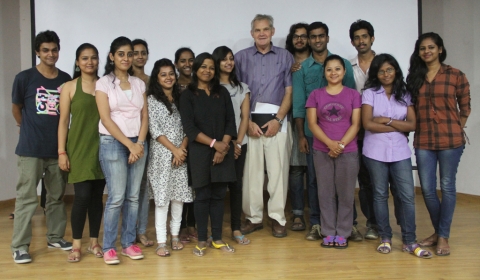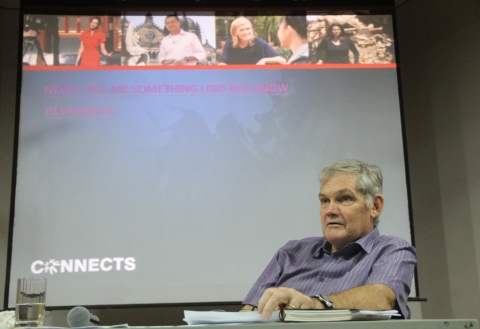
WMA students with Phillip Turner

CNN’s New Delhi Bureau Chief, Phillip Turner, speaks to WMA students
CNN’s New Delhi Bureau Chief, Phillip Turner visited students at the 9.9 School of Convergence and World Media Academy to talk about his remarkable journalism career, including 30 years with the world’s first 24-hour news network.
The son of missionaries, Turner spent part of his childhood growing up in South India. In his 30 years at CNN, Turner has reported extensively from Asia.
Acknowledging that being a journalist can be difficult, Turner told the students that the challenges range from low pay to getting people to talk on the record. That said, he emphasized that journalism is also a life committed to getting the facts and arriving at the truth. “The who, what, when, where, why will keep you steady in your life as a journalist,” Turner said.
Turner said the most important part of journalism is words and how you go about building a story. He said attributing quotes and statements and making sure content is authentic is a must, especially in a world where information is so quickly disseminated.
Credibility is a huge issue in India's vibrant and jumbled television industry. The media and individual journalists here are often accused by politicians and the government of being biased to a particular interest group.
Turner reminded the students to be aware of their personal safety, especially in conflict situations. According to the website of the New York-based Committee to Protect Journalists (CPJ), 51 journalists have been killed around the world so far this year in cases where the motive has been confirmed.
Turner praised World Media Academy’s head of broadcast Amey Polekar for his instruction in videography. Students at WMA are taught how to shoot news stories on professional cameras as well as how to edit on Final Cut Pro.
Amey showed the work of students from WMA's class of 2011-12. Being a professional news cameraman himself, Turner appreciated the shot sequencing in the stories. He also had a great tip for the students: The proof of whether a story is shot well is if it can tell itself without support from narration, Turner said.